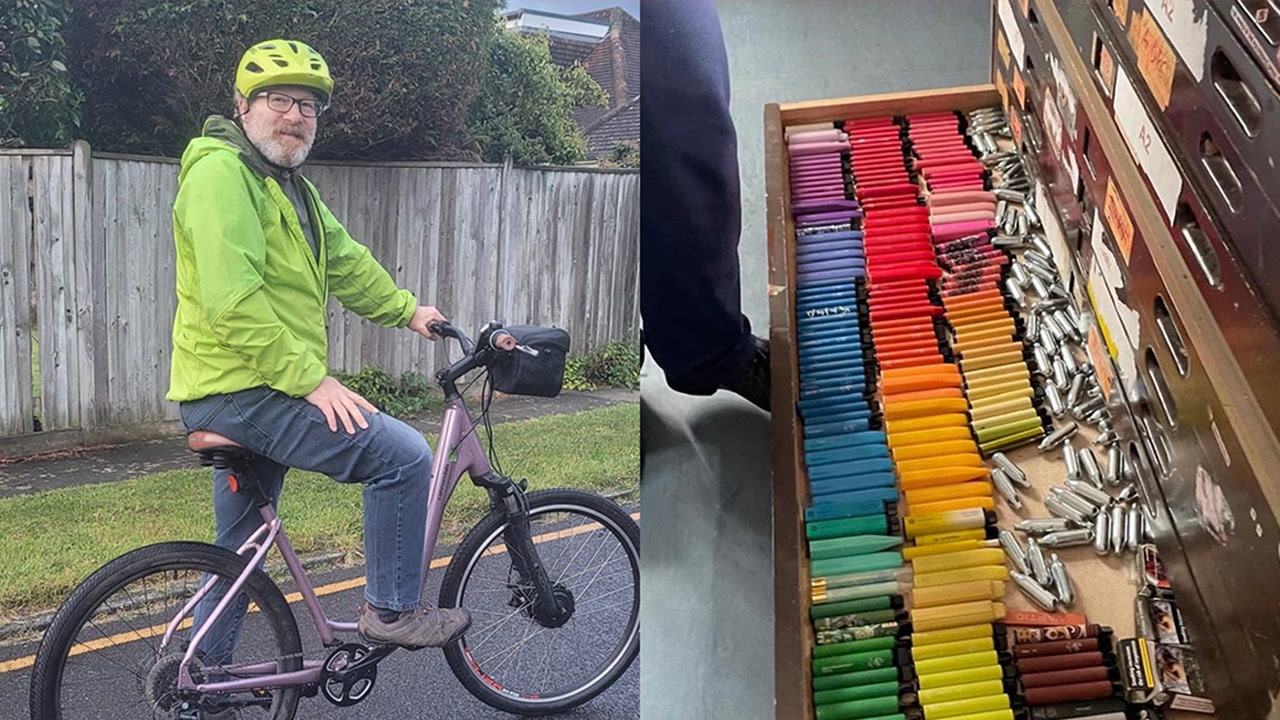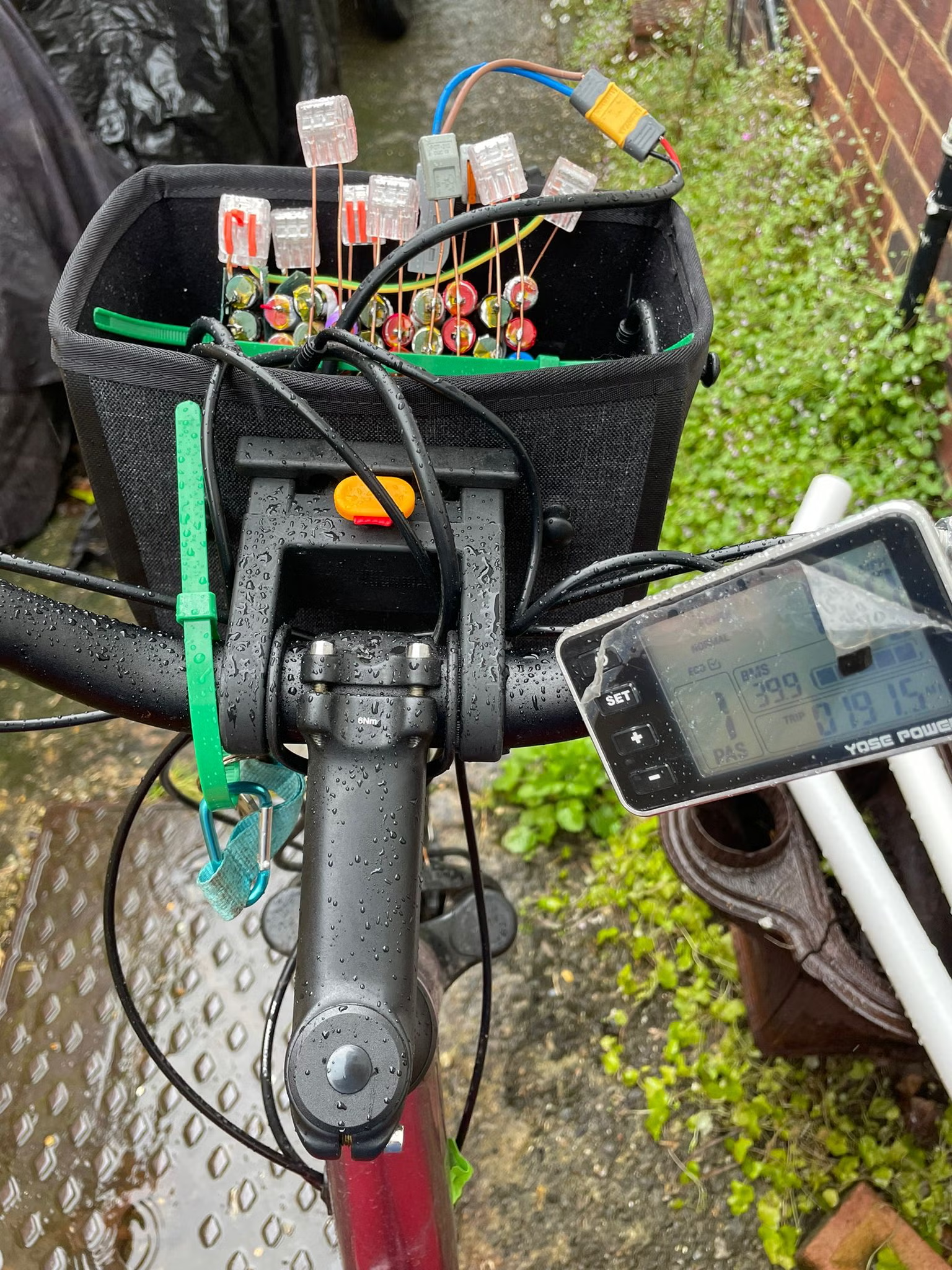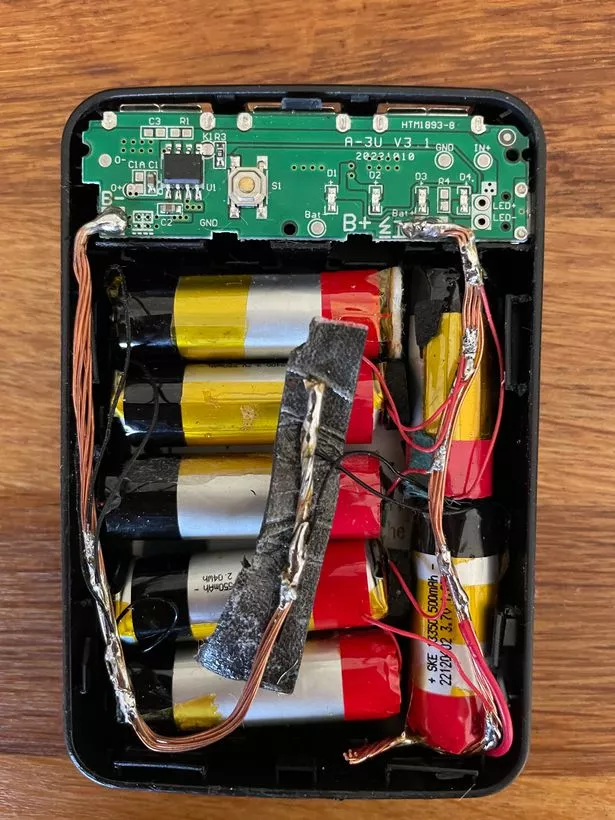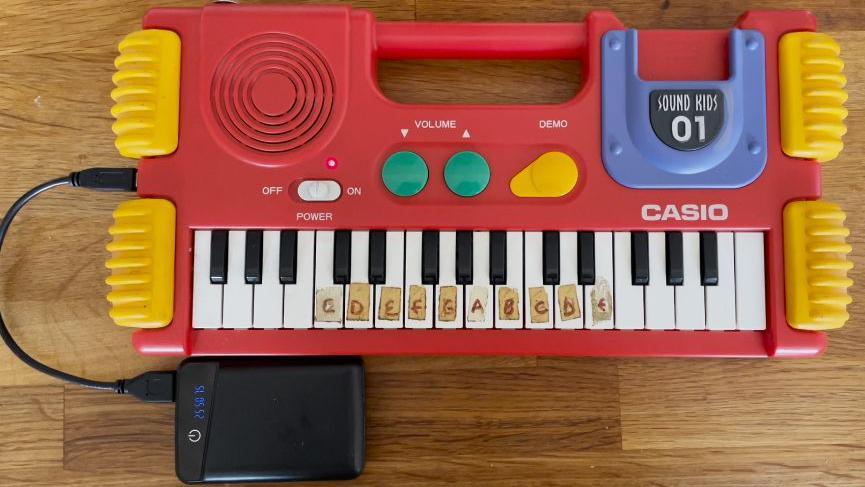Mark Hopgood, Dad of 2 from Sevenoaks Makes E-Bike from Recycled Vapes
Mark Hopgood, a father of two from Sevenoaks, has created an innovative e-bike by repurposing 70 disposable vape batteries. Using his background in software engineering and a practical approach to sustainability, he transformed a standard bicycle into a functional electric bike capable of reaching speeds up to 15 mph.
By wiring together discarded vape batteries, Hopgood avoided spending over £1,200 on a new e-bike and instead built a cost-effective, eco-friendly alternative. His project demonstrates how everyday waste products can be reused to power personal transportation in a creative and efficient way.
This unique solution highlights both technical skill and environmental awareness. Hopgood's e-bike not only serves his daily commute but also powers his phone and music equipment, showcasing its versatility beyond simple transportation.
Mark Hopgood's Background
Mark Hopgood is a skilled software engineer and a dedicated musician. Living in Sevenoaks, Kent, he balances his professional work with creative and practical projects. His inventive approach combines technical knowledge with hands-on skills.
Personal Life in Sevenoaks
Mark Hopgood lives in Sevenoaks, a town in Kent known for its residential community and green spaces. At 55 years old, he has spent significant time cultivating a lifestyle centered around innovation and resourcefulness.
His daily life includes commuting and engaging in creative pursuits. The local environment supports his interests in sustainable living and technology. This setting has influenced his approach to problem-solving and recycling.
Mark's activities often involve collaboration with those around him, fostering a community-based attitude toward shared environmental and practical challenges.
Family and Interests
Mark is a father of two children. His son Ned, who is 20, actively supports Mark's projects by collecting discarded items like vape batteries. This partnership highlights a family interest in creative reuse and technology.
Besides engineering, Mark is also a musician. He uses recycled vape batteries to power musical equipment during live performances. This blend of technology and music shows his diverse skill set.
The family's combined efforts emphasize practical solutions and sustainability, with each member contributing to innovative projects in everyday life.
Commitment to Sustainability
Mark has consistently demonstrated a strong commitment to environmental responsibility. He collects used disposable vape batteries from public spaces to avoid electronic waste.
His innovative reuse of these batteries to power an e-bike and charge devices illustrates a practical approach to sustainability. This reduces waste and offers an affordable alternative to traditional electric bike batteries.
Mark's work reflects a broader message about recycling electronic materials and promoting eco-friendly practices in common technology uses.
Inspiration Behind the E-Bike Project
Mark Hopgood's project began from practical needs and a desire to reuse discarded materials thoughtfully. His approach combined innovation, environmental mindfulness, and family support to create a functioning e-bike from unconventional components.
Motivation to Recycle Vapes
Mark was faced with an expensive replacement cost after his electric bike broke down, quoted at around £1,200. This sparked his interest in finding a more affordable, sustainable alternative. He realized that disposable vape batteries, which are typically thrown away, could serve as a power source.
Collecting these discarded batteries not only offered a budget solution but also addressed electronic waste. His work turned everyday trash into usable energy, demonstrating a practical application of recycling that others could replicate or learn from.
Initial Concept Development
Mark's engineering background helped him assess the feasibility of using multiple vape batteries to power a bike. He sourced 70 disposable vape batteries, testing each for performance and safety. Combining them required careful consideration of voltage, capacity, and arrangement to achieve consistent power output.
He adapted a seven-speed pink Cannondale Adventure 2 bicycle, integrating the battery pack in a way that balanced weight and functionality. The e-bike reached speeds up to 15 mph during testing, proving the concept viable for daily commuting.
Family Influence on the Idea
Mark's family played a key role in the project's success. His son Ned, an art student, assisted in collecting used vapes and contributed to testing batteries. This teamwork encouraged a shared purpose, uniting their skills and interests.
The project also became a creative family endeavor, merging Mark's technical expertise with Ned's artistic perspective on repurposing waste. Their collaboration highlighted how family involvement can enhance both the innovation process and practical execution.
Recycling Vapes for E-Bike Construction
Mark Hopgood repurposed 70 disposable vape batteries to power his e-bike. The process involved careful selection, safe handling of components, and attention to the environmental benefits of reusing electronic waste.
Sourcing Used Vapes
Mark collected 70 disposable vapes, selecting batteries that still held enough charge for reuse. He sourced these from friends, local recycling points, and online communities focused on electronic waste.
Each vape battery needed assessment for voltage and capacity to ensure consistent power output. Mark prioritized batteries in decent condition to maintain safety and performance when wired together.
This approach saved on costs and reduced the need for new lithium-ion cells. It also provided a way to keep discarded electronics out of landfills.
Safe Extraction of Components
Removing batteries required care to avoid damaging cells or causing short circuits. Mark used insulated tools to separate batteries from casings safely.
Each battery was tested for physical damage and leaks before assembly. Damaged cells were discarded to prevent issues like overheating or fire risk.
The batteries were wired and housed securely to maintain electrical safety while riding. Mark ensured proper insulation and battery management to control charging and discharging.
This careful handling minimized hazards associated with reused lithium-ion batteries in a custom e-bike setup.
Environmental Impact
By recycling disposable vape batteries, Mark reduced electronic waste sent to landfill. Lithium-ion batteries contain valuable materials like lithium and cobalt, which are energy-intensive to mine.
Reusing these components extends their life and lessens demand for new resources. It helps cut the environmental footprint tied to battery production and disposal.
Additionally, this method provides a practical example of upcycling consumer waste into functional, renewable energy solutions. It shows how small-scale projects can contribute to sustainability through smart reuse.
Engineering the Custom E-Bike
Mark Hopgood's project required detailed planning of the bike's power system and structure. He designed the battery setup carefully, selecting components to maximize efficiency. Several practical challenges arose during assembly, especially integrating unconventional power sources into standard bike parts.
Technical Design Process
Hopgood began by evaluating the electric bike's power needs, focusing on speed and range. He chose a seven-speed Cannondale Adventure 2 as the base bike for its robustness and compatibility with electric components. The design aimed for a top speed of approximately 15 mph, suitable for daily commuting.
He mapped out the electrical circuit to ensure proper voltage and current supply. Safety measures, including circuit protection, were included to handle the unique power source. The framework was modified to support the battery pack securely without compromising the bike's balance or durability.
Battery Integration from Vapes
The heart of the e-bike's innovation lies in its battery system, built from 70 disposable vape batteries. Hopgood carefully harvested lithium-ion cells from these vapes and reassembled them into a functional battery pack. This approach allowed him to recycle e-waste effectively.
The batteries were wired in series and parallel to deliver adequate voltage and current. This setup provided enough power to sustain a steady 15 mph speed. He also incorporated a battery management system to monitor charge levels and prevent overheating, ensuring reliable performance over time.
Assembly Challenges
Fitting the vape batteries into a cohesive pack required custom enclosures and precise wiring. Hopgood faced difficulties in safely arranging numerous small cells without risking short circuits or damage. Balancing weight distribution was also critical to maintain ride stability.
Integrating the electrical system with the bike's mechanical components took careful adjustments. The motor and control units needed alignment with the frame's geometry. Additionally, weatherproofing the electrical parts posed challenges, addressed by using protective casings and seals.
Performance and Features of the E-Bike
Mark Hopgood's e-bike converts a traditional seven-speed pink Cannondale bicycle using 70 recycled disposable vape batteries. It reaches speeds up to 15 mph and incorporates practical safety and design features suitable for daily commuting and urban travel.
Range and Efficiency
The e-bike runs on a battery pack made from 70 lithium-ion vape batteries linked together. This setup offers a reliable power source capable of supporting typical daily commutes without frequent recharges.
Mark's design focuses on energy efficiency by leveraging lightweight batteries, which helps maintain reasonable range and battery life. The bike can cover an estimated distance consistent with short to moderate urban routes, balancing power output and weight to optimize performance.
Charging takes place via standard electrical outlets, with the battery pack designed for easy removal and replacement. The reuse of vape batteries not only extends their lifecycle but also reduces electronic waste.
Safety Features
Safety on the e-bike includes robust mechanical brakes suitable for frequent stopping in city environments. Mark ensured that the battery installation is secure and insulated to avoid electrical hazards or damage from vibration.
The electric components are housed to protect wiring and connections from moisture and impact. This reduces risks related to electric shorts or battery failures during rides.
Additionally, the bike retains standard reflectors and can accommodate lights for visibility during low-light conditions. The conversion does not compromise the structural integrity or control of the original bicycle.
Unique Design Elements
The e-bike's standout feature is its use of disposable vape batteries repurposed into a composite battery pack. This innovative approach is both eco-friendly and cost-effective compared to commercial e-bike batteries.
Mark incorporated practical modifications to the original seven-speed frame, ensuring the bike remains balanced despite the additional battery weight. The pink "ladies' bicycle" aesthetic is preserved, making the bike visually distinctive.
The modular battery design allows flexibility in power management, as batteries can be swapped or repaired individually. This adds a layer of sustainability and convenience uncommon in typical e-bike systems.
Community and Environmental Impact
Mark Hopgood's project brought practical solutions to local environmental and social challenges. His inventive use of discarded vape batteries has influenced attitudes toward sustainability and reuse in Sevenoaks, demonstrating tangible benefits for both the community and the environment.
Local Awareness in Sevenoaks
Hopgood's work raised awareness about electronic waste within his community. By visibly converting an ordinary bike into an e-bike with recycled batteries, he sparked conversations around the volume of discarded vapes in local public spaces.
Residents became more conscious of how small electronic devices contribute to pollution. The project encouraged some community members to collect used vape batteries and participate in recycling initiatives. Local media coverage further amplified these messages, reaching a wider audience in Sevenoaks and nearby areas.
Inspiring Others to Reuse
Hopgood's approach has motivated others to think creatively about reusing waste materials. His example showed that discarded electronic components could serve new functions beyond traditional recycling.
Artists, students, and hobbyists in Sevenoaks and beyond found inspiration in his project. Notably, his son Ned, an art student, incorporated recycled vape batteries into his own work, showing how sustainability can intersect with creativity.
This reuse culture promotes innovation in managing waste streams without relying solely on conventional disposal methods.
Reducing E-Waste
By recovering and repurposing 70 lithium-ion batteries from disposable vapes, Hopgood directly reduced the amount of electronic waste destined for landfills. Each vape battery reused is one less toxic item contributing to environmental degradation.
His project serves as a practical example of extending the lifecycle of electronic components. It highlights the feasibility of small-scale, community-driven actions to minimize e-waste and combat the environmental issues linked to the rapid turnover of single-use electronics.
Hopgood's efforts contribute to lowering demand for new battery production, which has its own environmental footprint.
Future Plans and Innovations
Mark Hopgood aims to expand his use of recycled vape batteries beyond his personal e-bike project. He is exploring ways to increase the impact of his sustainable initiatives and considering partnerships to enhance both innovation and reach.
Scaling Up Sustainable Projects
Hopgood plans to collect larger quantities of disposable vape batteries to power more e-bikes and portable devices. He is developing a more efficient system for harvesting and refurbishing these batteries to boost reliability and safety.
He also intends to refine the battery pack design, improving durability and reducing maintenance needs. This approach could enable broader community use, promoting eco-friendly commuting options while minimizing electronic waste.
Potential Collaborations
Hopgood is interested in working with local governments and environmental organizations to establish public recycling programs for disposable vape batteries. Collaboration with manufacturers or tech companies could help formalize collection and repurposing processes.
He is also open to partnering with educational institutions to create workshops or demonstrations, spreading awareness of battery recycling through practical applications. These partnerships could support scaling his initiative while ensuring safety and technical standards.
Long-Term Vision
Hopgood envisions a future where discarded batteries become a common energy source for various small electric vehicles and electronics. He aims to influence the design of future batteries to enhance recyclability from the outset.
His long-term goal includes developing a sustainable circular economy model for vape batteries, reducing landfill waste and carbon footprints. By demonstrating practical reuse, he hopes to inspire similar innovations in electronic waste management.




